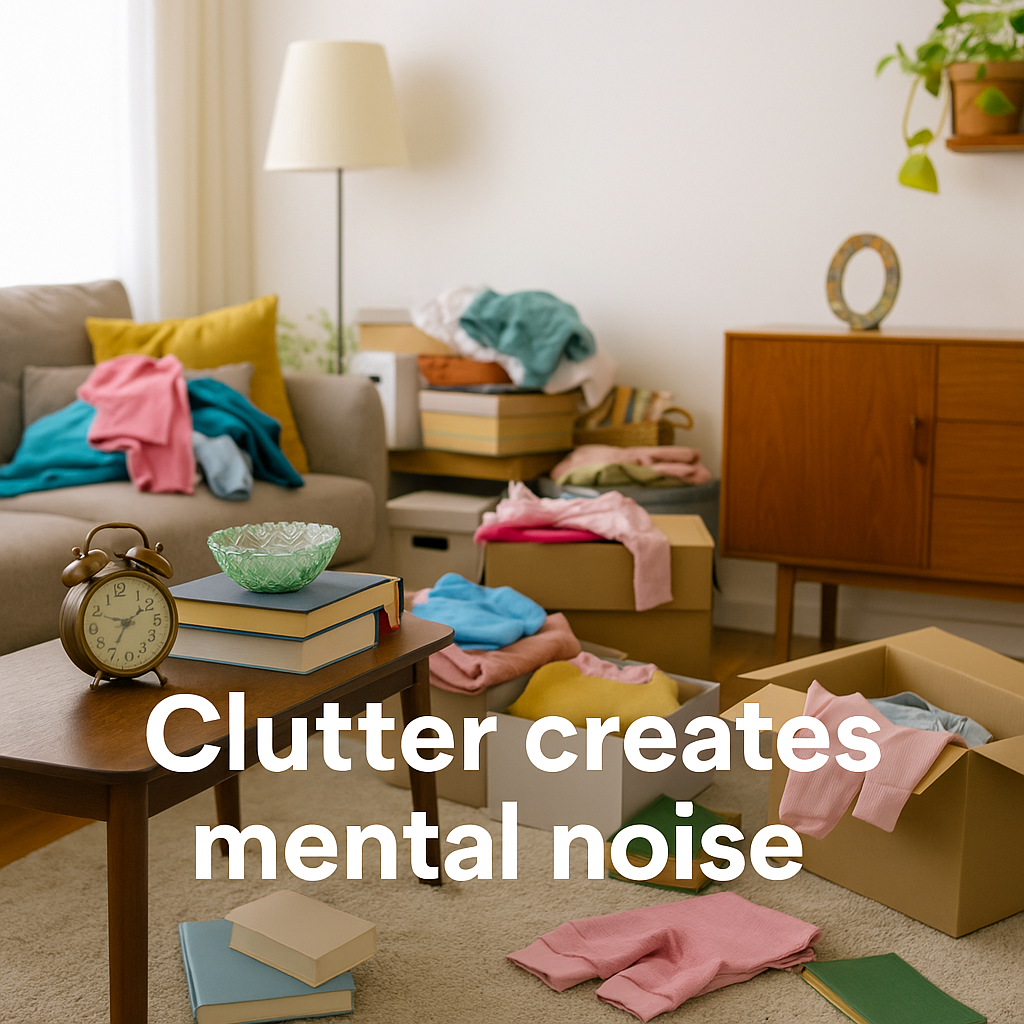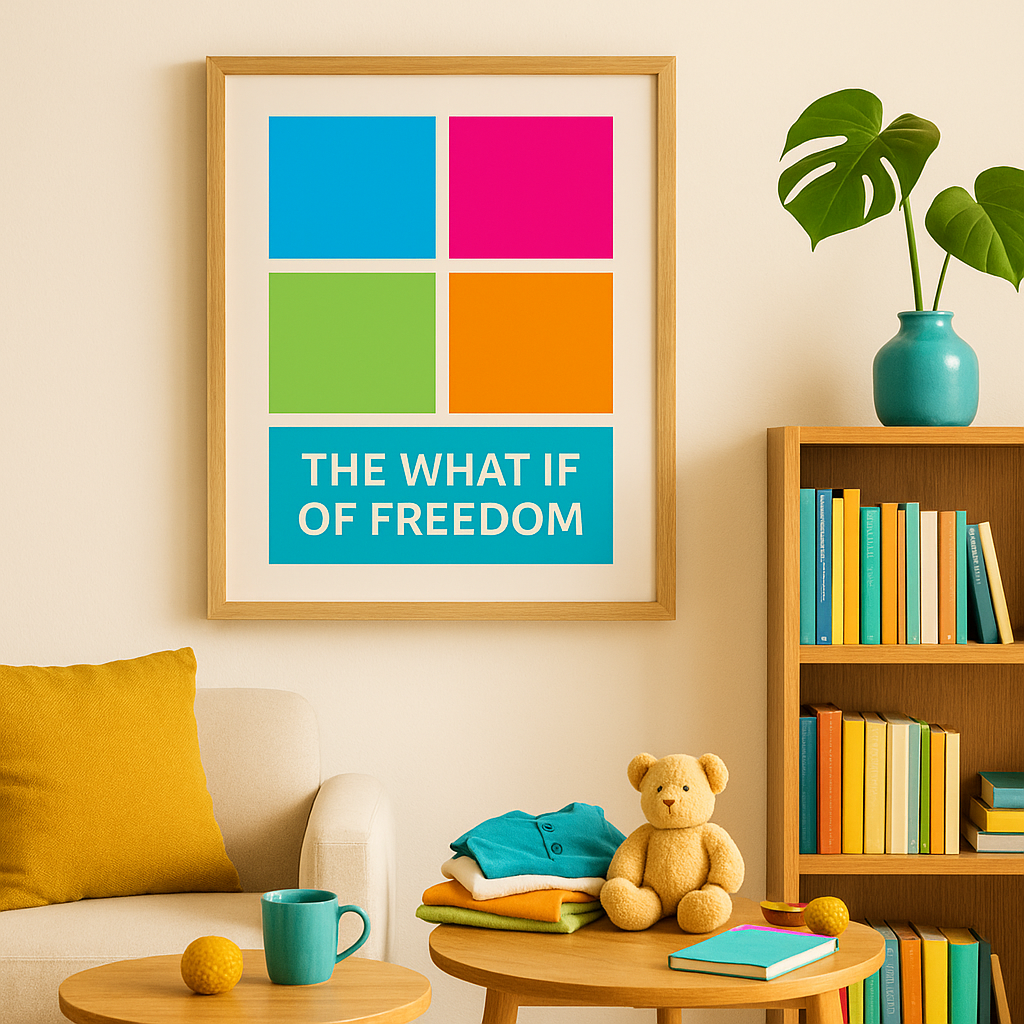Decluttering and Letting Go
We live in a world that places a high value on things. Birthdays, holidays, anniversaries, and milestones often arrive wrapped in ribbons, bows, and decorative paper. Over time, these moments — however joyful at the time — fill our homes with gifts, keepsakes, and mementos. Each piece carries a story: a trip taken, a person loved, a season of life remembered.
But along with the memories, there can also be a quiet weight. Many people live with the unspoken belief that parting with these objects means dishonoring the person who gave them or erasing the moment from history. The sentiment is understandable, but it can keep us holding on to far more than we need.
The truth is simple: you don’t need to keep everything to keep the meaning. Sometimes, letting go is not just acceptable — it’s the most loving and freeing choice you can make for yourself, your home, and your peace of mind.
Why We Feel Guilty About Letting Go
Guilt is one of the biggest obstacles to decluttering sentimental items. Our minds run through familiar questions:
If I get rid of this, am I rejecting the person who gave it to me?
Will I forget the memory if I don’t have the physical reminder?
What if they find out I no longer have it?
These worries are deeply human, but they’re built on a misconception. A gift is an expression of care in the moment it’s given — it is not a lifelong contract. Once something is yours, it’s yours to decide how long it serves you. The connection to the person or event exists in your heart and mind, not in the physical object.
If a sweater from your grandmother no longer fits your life, you can still love her deeply without holding onto it. If a friend gives you a decorative item that doesn’t match your style, you can still value their thoughtfulness while allowing the item to move on to someone who will use it. The gift fulfilled its purpose the moment it made you feel loved.
The Weight of Too Many Things
Imagine every drawer, closet, and storage bin filled with items you feel “obligated” to keep. Your home can quickly start to feel less like a place to live and more like a museum of your past. At first, those objects may bring a smile. But over time, they can feel like a burden — a visual reminder of decisions you haven’t made and space you no longer have.
Clutter creates mental noise. You may find yourself rearranging things you don’t actually want, feeling frustrated at the lack of space, or avoiding certain areas of your home altogether. And here’s the irony: when you keep everything, the truly meaningful items lose their specialness. They’re hidden among dozens of other “memories” that aren’t as important.
By keeping only the most precious, you give those select pieces the space to shine. Your home becomes a reflection of your current life and values, not just a storage facility for every season you’ve lived through.
Shifting the Perspective
The question isn’t “How could I possibly let this go?” but rather:
Does this still bring me joy or meaning today?
Am I keeping it out of love or guilt?
Would I choose it again if it came into my life right now?
If the answer is no, it’s more than okay to release it. Letting go doesn’t erase the story behind the item. In fact, with fewer physical reminders, you may find that you remember moments more clearly because you’re no longer distracted by the excess.
This is about being intentional. If something no longer serves your life today, it’s safe to thank it for the role it played and let it move on.
Honoring Without Holding On
Releasing an item doesn’t mean you erase its story. You can preserve the sentiment in other ways:
Take a photo – A digital image can preserve the memory without taking up physical space.
Write the story – Capture the experience in a journal or digital scrapbook, deepening your connection to the moment.
Pass it on – Gift the item to someone who will truly enjoy and use it, allowing the joy to live on.
Repurpose it – Transform old fabrics into quilts, broken jewelry into charms, or greeting cards into framed art.
This way, the meaning remains, but the object no longer takes up valuable space in your home.
The Value of Letting Go
Letting go is not about being ungrateful. It’s about creating harmony between your past and your present.
When you release what no longer serves you:
You create space for the present – Both physically and emotionally, you open up room for new memories, experiences, and connections.
You reduce mental clutter – A simplified environment promotes calm and focus.
You reclaim control – You decide what earns a place in your home and in your life.
You deepen relationships – By detaching love from physical objects, you free yourself to appreciate people for who they are, not what they’ve given you.
Letting Go as Self-Care
We live in a culture that rewards accumulation. From glossy advertisements to social media “haul” videos, we are constantly told that more is better — more clothes, more gadgets, more décor, more keepsakes. Success is often measured by what you have rather than by who you are. In such an environment, choosing to let go can feel like swimming against the current. It’s not just a simple decluttering decision — it’s a statement of values.
When you choose to release an item, you’re quietly but firmly declaring: My well-being matters more than my stuff. You’re affirming that your peace of mind, the openness of your space, and the clarity of your surroundings are worth more than the weight of possessions you no longer need or love.
Letting go doesn’t mean you no longer care about the memory or the person associated with the object. In fact, it often means the opposite — that you respect the memory enough to keep it free from the burden of obligation. Each time you release something — whether it’s a knick-knack from a trip, books you have no interest in reading, or a stack of greeting cards you haven’t looked at in years — you’re making a conscious choice to carry the sentiment, not the clutter.
This act of release is also an act of trust — trust that the value of your experiences is not bound to the physical items they left behind, trust that the relationships you cherish are built on love, not things, and trust that your home will feel lighter, calmer, and more joyful when filled only with what truly serves you today.
With each item you let go, you reclaim a little more freedom. You create room — both physically and mentally — for new experiences, new memories, and a new chapter of your life. The space you open up is not a void to be filled with more “stuff” but a gift you give yourself: the gift of breathing room, mental clarity, and a home that reflects the life you are living now.
Letting go, then, is more than tidying up. It is an act of self-respect. It is choosing the present over the past, serenity over obligation, and meaning over material excess.
A Final Thought
Life is not meant to be lived under the constant pressure of “what if”. Instead of worrying about what you might forget or what someone might think, imagine the “what if” of freedom:
What if I had more room to breathe?
What if I walked into my home and felt only peace?
What if every item I owned made me smile?
Letting go is not about loss. It’s about creating space for what truly matters — and realizing that the most beautiful way to honor a person or a memory is to carry it in your heart.






